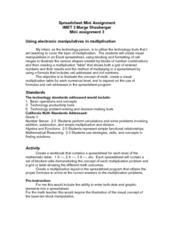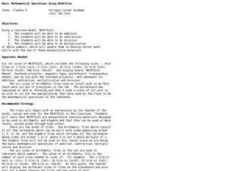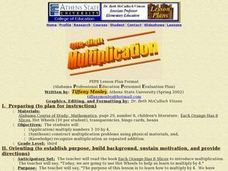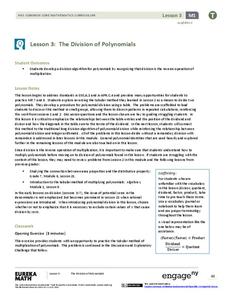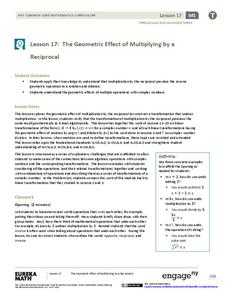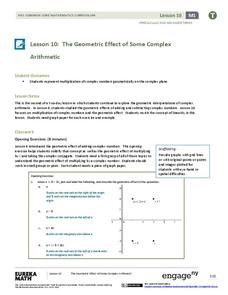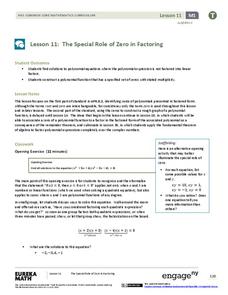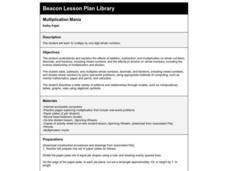Utah Education Network (UEN)
Pattern Search
Pupils identify and define various mathematical properties, such as the commutative properties of addition and multiplication, and the associative property of addition. They also reason and communicate mathematically by making...
Curated OER
Gifts from Grandma, Variation 1
Composed of three word problems, this math activity exposes young mathematicians to relationships present in multiplication and division. The first problem is most useful with a tape diagram in which learners are working with equal-sized...
Curated OER
The Facts, Gimme the Facts!
Students engage in a variety of activities which help them memorize their times tables. There are some very good ideas imbedded in this plan of how to systematically teach the basic facts in a way that help students retain what they learn.
Curated OER
Math Facts Game
Students practice math skills while playing a flash cards game. When the teacher displays a flash card with a multiplication fact on it, students try to be the first to call out the correct answer.
World Wildlife Fund
Take 6
Investigate the various properties of the number six with this elementary math lesson. From simple addition, subtraction, multiplication, and division problems to the creation of hexagonal tessellations, this lesson covers all aspects of...
EngageNY
Grade 5 Math Module 1, Topic A, Lesson 1
Extend the place value system. The first lesson plan in a series of 18 extends the place value system to millions through thousandths. Using place value charts, pupils see how the value of a digit changes as it moves places. Teachers use...
Curated OER
Using Electronic Manipulatives in Multiplication
Factor polynomials using electronic manipulatives. Your class will create a spreadsheet in excel and use it to multiply and perform basic operations and solve problems correctly. They create a visual to go along with each multiplication...
Curated OER
Basic Mathematical Operations Using Math Tiles
Practice addition, subtraction, multiplication, and division using tiles as manipulatives. In this math operations lesson, young learners choose the appropriate sized tiles, arrange them according to directions given by the teacher, and...
Curated OER
One-Digit Multiplication
Students multiply the numbers one through ten by four, construct multiplication problems using physical materials, and recognize multiplication as repeated addition. They practice by playing multiplication Bingo.
Curated OER
Mathematics Within: Algebraic Processes and Its Connections to Geometry
Students analyze multiple strategies of multiplication: clustering, area model, breaking apart/decomposing, etc. They create their own strategies to approaching multiplication problems and share them with their classmates. Discussion...
EngageNY
The Division of Polynomials
Build a true understanding of division of polynomials. Learners use their knowledge of multiplying polynomials to create an algorithm to divide polynomials. The area model of multiplication becomes the reverse tabular method of division.
EngageNY
The Geometric Effect of Multiplying by a Reciprocal
Class members perform complex operations on a plane in the 17th segment in the 32-part series. Learners first verify that multiplication by the reciprocal does the same geometrically as it does algebraically. The class then circles back...
EngageNY
Using Matrix Operations for Encryption
Data encryption is an important security measure for sensitive data stored on computers. Pupils learn how to utilize matrices for creating code. They also get a great review of matrix multiplication, inverse matrices, and the identity...
EngageNY
Exploiting the Connection to Cartesian Coordinates
Multiplication in polar form is nice and neat—that is not the case for coordinate representation. Multiplication by a complex number results in a dilation and a rotation in the plane. The formulas to show the dilation and rotation are...
EngageNY
The Geometric Effect of Some Complex Arithmetic 2
The 10th activity in a series of 32, continues with the geometry of arithmetic of complex numbers focusing on multiplication. Class members find the effects of multiplying a complex number by a real number, an imaginary number, and...
EngageNY
Replacing Letters with Numbers II
Teach about properties properly. Individuals investigate the commutative and identity properties for both addition and multiplication. They see that the properties hold true for all values by using substitution to test out several examples.
EngageNY
The Special Role of Zero in Factoring
Use everything you know about quadratic equations to solve polynomial equations! Learners apply the Zero Product Property to factor and solve polynomial equations. They make a direct connection to methods they have used with quadratic...
EngageNY
Getting a Handle on New Transformations 2
Use 2x2 matrices to move along a line. The second day of a two-day lesson is the 28th installment in a 32-part unit. Pupils work together to create and solve systems of equations that will map a transformation to a given...
EngageNY
Proofs of Laws of Exponents
Apply pupil understanding of exponent properties to prove the relationships. In the sixth instructional activity of the series, individuals are expected to prove relationships using mathematical statements and reasoning.
EngageNY
Equivalent Ratios II
What is the connection between equivalent ratios? Class members first find the multiplication factor used to create equivalent ratios. Next, they take that information to determine whether ratios are equivalent. The second lesson on...
EngageNY
The Long Division Algorithm
Two methods are always better than one! The eighth installment in this series asks pupils to convert decimals to fractions using two approaches. Individuals first use the more traditional approach of long division and then use reverse...
EngageNY
When Can We Reverse a Transformation? 3
When working with matrix multiplication, it all comes back around. The 31st portion of the unit is the third lesson on inverse matrices. The resource reviews the concepts of inverses and how to find them from the previous two lessons....
Curated OER
Everyday Mathematics: Multiples of 10
In this multiples of 10 worksheet, students sharpen their math skills as they learn to use multiples of 10 to help them with division and then try the 2 extra practice activities.








